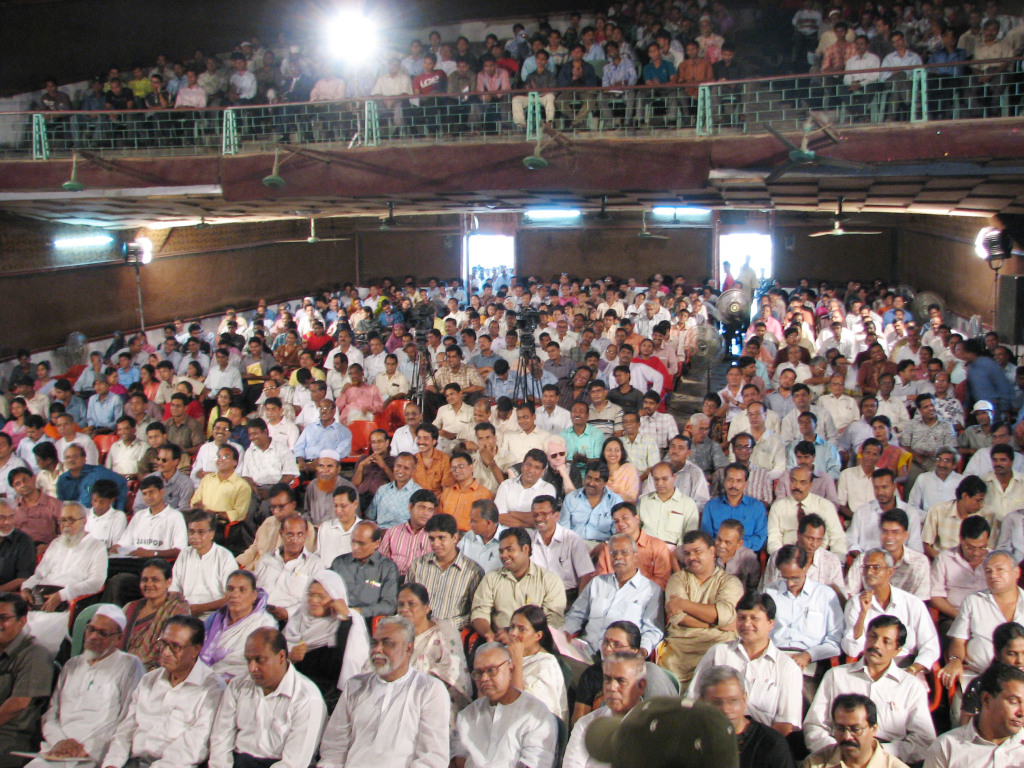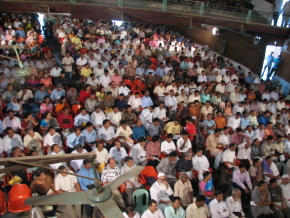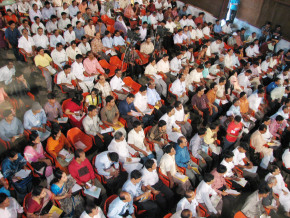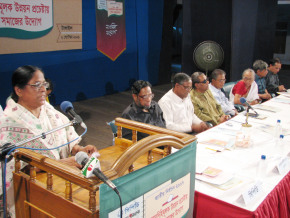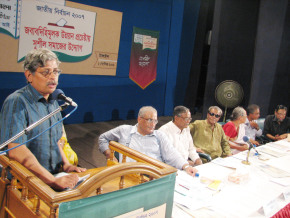The political parties should give explanation before a general election in case of failure to fulfil election pledges while in power, said speakers at the regional dialogue in Tangail (September 02, 2006).
They suggested introduction of modern education system and bringing necessary changes in the society for ensuring good, honest and dedicated leadership.
Identity card and electronic voting system will help to reduce election related corruption, they said.
The speakers also demanded the provision of spending at least 10 days in every month by a member of parliament in his or her constituency.
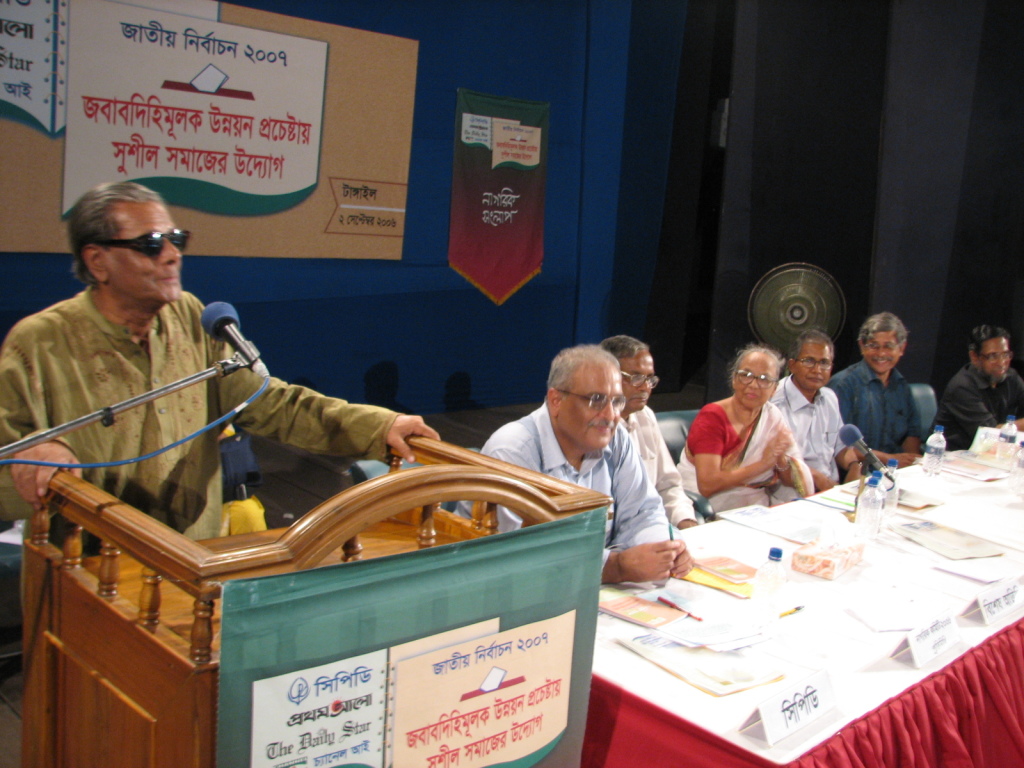
Centre for Policy Dialogue (CPD) organised the discussion at Bhashani Hall in the town with joint collaboration of The Daily Star, Prothom Alo and Channel i. The meeting lasted for about seven hours with a total of 700 people attending the discussion. Almost 125 people wanted to speak in the discussion but around 90 people were able to do so due to time constraints.
Prominent educationist and former principal of Government M Ali College Sekander Hyat chaired the dialogue titled ‘Election 2007: Campaign for honest and competent candidates’.
CPD Executive Director Debapriya Bhattacharya conducted the seven-hour long discussion attended by a large number of local elites including political leaders, lawyers, teachers, development workers, cultural activists, journalists and social workers.
Editor of The Daily Star Mahfuz Anam addressed the dialogue on behalf of the organisers while former member of caretaker government Hafiz Uddin Khan and Muhammad Zafar Iqbal took part in the discussion as members of Nagorik Committee 2006 formed for preparing a vision paper for Bangladesh 2021.
Criticising the prevailing system of election, the speakers said the Election Commission must go through massive reforms for ensuring a free and fair election in the country. They also expressed no-confidence in the present chief of the Election Commission and his deputies.
Speaking as special guest, Tangail Press Club President Mirza Mohammad Abdul Momen said constructing roads, bridges and high-rise buildings alone is not development.
True development means upgradation of people’s living standard by providing better health services, education and other amenities, he said.
He underscored the need for generosity and tolerance among the politicians for a stable economic growth in the country.
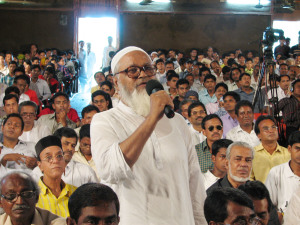 There are politicians but not enough of statesmanship in the country for which the pro-people upazila system got cancelled, he said, adding that induction of retired bureaucrats, army personnel and business tycoons destroyed the political culture in the country.
There are politicians but not enough of statesmanship in the country for which the pro-people upazila system got cancelled, he said, adding that induction of retired bureaucrats, army personnel and business tycoons destroyed the political culture in the country.
He regretted lack of democratic practice in the political parties.
Special guest Provaty Mutshuddy criticised the government for bringing changes in the women development policy. She said the minority community often becomes subject to repression after a general election.
“We have to create an atmosphere where people would not send their offspring abroad for education,” she said.
She urged the people to cast vote for honest and educated persons.
The honest and generous people are keeping themselves isolated from politics while bureaucrats and business tycoons are capturing the political powers, Mahbub Sadiq said.
Muhammad Zafar Iqbal demanded a modern education system in the country and urged the younger generation to work for building a country that would fulfil the dreams of the freedom fighters.
“Most of the people in Bangladesh are very honest, dedicated and hard working,” he said, adding that only a small portion of people in the society are responsible for making the country champion in corruption.
If the education systems are reformed and updated, the country will come out from all the major problems, Zafar Iqbal said.
An acute crisis is looming in the country following the discord between the two major political parties on the question of reforms in the election system, Hafiz Uddin Khan said.
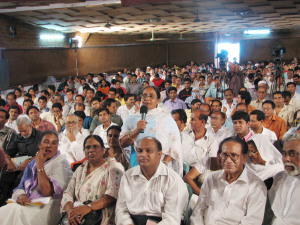 He demanded right to information for helping the people to choose honest and competent candidates in the general elections. Before the election, people should know in details about a candidate’s assets and liabilities and whether he or she is a loan defaulter or a bill defaulter, he said.
He demanded right to information for helping the people to choose honest and competent candidates in the general elections. Before the election, people should know in details about a candidate’s assets and liabilities and whether he or she is a loan defaulter or a bill defaulter, he said.
Khan pointed out that the candidates’ political background and criminal records should also be published before the election.
While preparing the election manifesto, the political parties should take people’s opinion, Mahfuz Anam said.
Democracy should not be confined only within the political parties and members of parliament, rather, it should reach up to the mass people, he said.
Anam expressed the hope that the honest and competent candidates will get nomination in the next general election and they will push the country towards progress and prosperity.
Demanding preservation of indigenous people’s right, indigenous leader Ajoy A Mri said when the political parties remain in the opposition bench they support the causes of indigenous people but they forget the pledges after going to power.
The indigenous people in the district suffered for development of the Eco Park and national garden, he said.
Expressing the hope that such dialogue will create an upsurge in the society and help bring qualitative changes in future, former state minister Abul Ahsan Chowdhury said people should not demand everything from the capital. Rather, everybody should be involved with the development.
An elected candidate should consider himself a representative of all the people of the area, he said.
Ahsan suggested formation of a consultation committee by every political party in each constituency before election for nominating competent candidates.
General Secretary of Tangail Chamber of Commerce and Industry Alamgir Khan Manu proposed election system on the basis of symbol without mentioning the name of candidates.
Khondoker Nazimuddin, senior vice president of district Jatiya Party, demanded clear declaration from the party concerned about the candidates who get nomination without doing politics.
He also demanded solution of water sharing problem with neighbouring India.
Muniruzzaman Bulbul, general secretary of Tangail district BNP, disagreed with the view that the civil society organised dialogue was tarnishing the image of the politicians. He hoped that the civil society initiative for honest and competent candidates would succeed.
Religious harmony is prevailing in the country and the minority community is observing their largest festival Durga Puja with much more enthusiasm than before, he said.
He suggested bringing change in the minds of politicians as well as in the political culture.
Prof Mirza Mazharul Islam urged the people to launch a social movement for competent candidates. He urged the people to cast vote for those who do not know how to earn black money.
Terming corruption, terrorism and nepotism social diseases that need urgent treatment, he said if the top brass of the government remains corruption-free others will follow them.
Shamsunnahar Shanti, president of Tangail Mohila Parishad, demanded increase in the number of seats for women in parliament.
The condition of women deteriorated after the changes and amendments to the government’s women development policy, she said. Shanti also opposed the nomination of moneyed men and terrorists for election.
Among others, Gholam Mohammad Khan, Bonshi Binod Goswami, Dr Abul Baset, Gopinath Mojumder, Dr S Hasan, Hosne Ara Ahmed Baby, Ataur Rahman Khan, Ataur Rahman Zinnah, Abul Hossain Mallik, MA Rouf, Al Shahriar, Hazi Rahmat Ali Talukder, Mofizur Rahman Nuru, Yusuf Ali, Hafeza Rahman, Hasan Hafizur Rahman, Mirza Mohammad Nurunnabi, Naimuddin, Rajesh Chandra, Ishrat Nadia, Rezina Akhtar, Shamsad Akhtar Lina, and Snigdha Sarker participated in the discussion.


